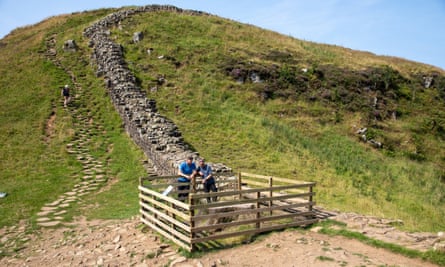The felling of the Sycamore Gap tree brought forth an outpouring of emotion last year, with local people and tourists alike left bereft by pictures showing it on its side.
But the latest stage of the saga has brought some “astonishing” green shoots of recovery, the National Trust has said – in a literal and metaphorical sense.
Signs of life and regrowth have been spotted on the stump of the tree, on Hadrian’s Wall.
The trust said eight new, desperately fragile shoots measuring between 2cm and 4cm had been discovered at the base of the tree’s stump, near the roots, giving hope that it will live on.
The tree in Northumberland was famous as a wonderful, photographable sight – but in the north-east of England it was regarded as something more: almost part of the region’s DNA.
It was planted as a landscape feature in a dell on Hadrian’s Wall 150 years ago, becoming the site of countless marriage proposals, scatterings of ashes and birthday celebrations. After featuring in Kevin Costner’s 1991 film Robin Hood: Prince of Thieves, it became world famous.
The tree’s felling on 28 September last year led to an outpouring of distress and sadness, combined with fury at the pointlessness of its loss.
Andrew Poad, the trust’s general manager at Hadrian’s Wall, said the hope had always been that nature would find a way to recover, but for it to happen so soon was a surprise.
“To see signs of life, just 10 months on, is astonishing,” he said. “Thankfully it was a big, mature, strong and vigorous tree so we hoped it would regrow but there has not been much sign of it through the growing season this year.”
He added: “We began to become a bit despondent about anything happening.”
Tree experts had advised it could be two or three years before there were any signs of regrowth.

The shoots were spotted by Gary Pickles, the ranger who was first at the scene when the tree was felled last year. “I remember saying hurriedly that it was gone,” he said. “Now, I hope I can say that it’s back!”
Pickles said it was complete chance that he decided to walk up to Sycamore Gap as he carried out a recce for a guided walk planned for September. He had done the same walk several times and seen nothing – until now.
“In my head I had consigned the tree to history … so I am amazed and delighted that it may have a future after all and is making a go of it,” he added.
Poad said the shoots were “incredibly fragile” and visitors were being asked to keep away. One stray boot would cause irreparable damage, he said.
Fencing and netting are being put in place to try to prevent anyone or anything harming the shoots, whether human, cattle, sheep, deer or rabbit. “There is no guarantee any of the shoots will survive so we need to give them the best possible chance,” said Poad.

What happens now is down to nature and tree management.
“There’s no guarantee they will all grow, it might be one, it might be all eight or it might be none,” said Poad. “Often, survival of the fittest, the strongest one will begin to dominate. Or if that doesn’t happen we can make an informed decision down the line about whether we want a single stem or whether we allow it to grow in a more bushy way.”
Whatever grows was unlikely to ever look like the felled tree, he said. “We are going to need to monitor it and either let nature take its course or manage the process ourselves to get the best result.”
Poad said it still felt “weird” that the tree was no longer there. “I’ve known it 30 years through work, so it is still difficult to get used to seeing the Sycamore Gap look the way it does. I’m really looking forward to seeing a tree in that place again.”
Tony Gates, the chief executive of Northumberland National Park Authority, said it showed the power of nature to regenerate.
“I know this news will bring hope to many people and a smile to many faces, and we will wait to see how these shoots develop. I am genuinely intrigued to see what nature will give us.”
The trust said seedlings gathered after the felling continued to flourish at its plant conservation centre and would be ready for planting in 1 to 2 years.
Prints made directly from the tree trunk have gone on display with plans for further artistic responses expected to be announced in the coming weeks.
Two men charged with the criminal damage of the tree are due to face crown court trial in December. They have denied the charges.
Source: theguardian.com


